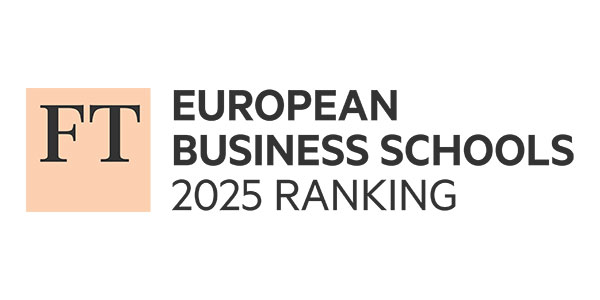MSc International Management
ApplyKey facts
- Start date: September
- Accreditation: AACSB, EQUIS & AMBA
- Study mode and duration: 12 months full-time
International experience: optional class taught at Toulouse Business School, France
Study with us
- develop the knowledge and skills required by international managers and leaders to operate in a global environment
- benefit from a practical focus on managing and leading in various organisational settings
- complete a practically-oriented project
- our Consulting in Practice module equips you with real-world consulting experience, enhancing your employability by applying academic theory to live client challenges
Prefer to start your course in January? We also offer this course with a January start.
If you're passionate about different cultures and, at the same time, willing to invest in your professional career, the MSc in International Management is the course for you.
The Place of Useful Learning
UK University of the Year
Daily Mail University of the Year Awards 2026
Scottish University of the Year
The Sunday Times' Good University Guide 2026
Why this course?
Our MSc International Management will help you to develop the knowledge and skills required by international managers and leaders to operate globally. It focuses on the practical skills of working, managing and leading in various organisational settings.
The course will provide a broad knowledge of the practices and processes of international management. You’ll develop an understanding of the national and global contexts in which international managers operate and gain an appreciation of how those contexts have an impact on managerial expectations and preferences in different cultural environments.
Strathclyde Business School
Strathclyde Business School (SBS) was founded in 1948 and is a pioneering, internationally-renowned academic organisation with a reputation for research excellence. One of four faculties forming the University of Strathclyde, SBS has held triple accreditation from the three main business school accreditation bodies – AACSB, EQUIS and AMBA – since 2004. Our subject departments and specialist centres collaborate to provide a dynamic, fully-rounded and varied programme of specialist and cross-disciplinary courses.


Through the programme you'll:
You'll develop the knowledge and skills required to become an effective international manager leading a range of different organisations, from small and large multinationals, with a focus on the practical skills of working, managing and leading in various global and cultural settings.
Through core modules such as Managing Across Cultures, Global Business Environment, and International Entrepreneurship, you'll gain understanding of the national and global contexts in which international managers operate and appreciation of how those contexts impact managerial expectations and preferences in different cultural environments.
Through the Business Strategy module, you'll learn the process of building and deploying effective strategy while you will put learning into practice in the Consultancy in Practice module by engaging with a real organisational problem provided by a client company, enabling you to apply your cross-cultural management expertise to real-world international business challenges.
You'll develop:
- lifelong learning skills to recognise developmental needs as international managers and leaders
- research and analysis skills to identify and critically evaluate strategic choices facing international managers
- application skills to apply theoretical models, tools and techniques of international management to different company, country and sectoral contexts
You'll develop a range of soft skills, including communication skills, report writing and effective presentations, alongside team-working skills to apply theory to practice in operating within multicultural teams and experience problem-solving across cultural boundaries.
Graduates have secured positions with various leading multinational organisations, including:
- Morgan Stanley
- KPMG
- Goldman Sachs
- Microsoft
- Ryanair
This demonstrates the programme's strong international employability outcomes.
You'll be part of a collaborative learning experience that enables building collective understanding in questioning the global issues impacting organisations. You'll benefit from a curriculum that reflects latest business thinking, with opportunities to customise learning through elective modules aligned to personal career objectives and international management interests.
The programme's international focus is embedded in class experiences where examples, case studies, and guest speakers explore how companies operate in different cultures across geographical regions.
You also have the option to take the Managing in Europe elective module taught at our partner institution, Toulouse Business School in France.
You'll identify and develop the soft skills needed as a future international manager or leader on the Professional Management Practice module through a combination of workshops and learning exercises, utilising a personal development plan process.
You'll critically evaluate how your skills and attributes contribute to effectiveness, with workshops and exercises helping you to fulfil your potential.
You'll develop an entrepreneurial mindset within international contexts, with modules examining business idea generation, opportunity evaluation and overcoming internationalisation obstacles across different cultural contexts.
You'll have access to Strathclyde Inspire, a University-wide, sector-leading initiative that supports and encourages all forms of entrepreneurship, providing further opportunities to develop an entrepreneurial mindset – a useful attribute in any future career to drive innovation and organisational change. If you have an ambition to pursue an entrepreneurial path, Strathclyde Inspire will support and help you in that process.
What you'll study
You’ll begin with an introduction to the Professional Management Practice programme. This class runs throughout Semesters 1 & 2 and offers a combination of workshops and learning exercises. You’ll have the opportunity to identify and develop the soft skills needed as a future international manager or leader.
The project provides the opportunity to explore, at length, some aspects of theory or methods, knowledge or skills introduced on the taught element of the programme. It's supported by a class in project methodology.
In Semester 3, you'll also choose two elective classes to further develop your knowledge. If you're interested in studying abroad, the Managing in Europe elective class provides the opportunity to do this with classes taught at Toulouse Business School, France.
Learning & teaching
The course is designed to be a collaborative learning experience – a partnership between academic staff and students. It enables you to build on your collective understanding in interrogating the global issues impacting organisations. It's taught through a combination of lectures, workshops and group learning exercises.
On the programme, you'll gain:
- lifelong learning skills: to recognise developmental needs as international managers and leaders, and identifying opportunities to tackle these
- research, analysis and problem-solving skills: to develop skills in the use of library and internet-based resources; to identify, analyse and critically evaluate the strategic choices and options facing international managers
- application skills: to apply models, tools and techniques of international management to different company, country and sectoral contexts; to integrate the knowledge from a range of international management subjects
- communication skills: to develop report writing skills; to structure and present complex data and ideas; to make effective presentations and to acquire skills in argument and debate
- team-working skills: to appreciate the benefits and challenges of working within teams; to apply theory to practice in operating within multicultural teams; to experience problem-solving within multicultural teams; to improve time management and workload planning capacities
Assessment
The course is assessed through written assignments, group and individual projects or reports, class tests and presentations. Class tests and one case study assessment are taken under exam conditions.
Meet the students
Students Tweety and Anjua tell us a bit more about the course.
Professional Management Practice
This class develops your awareness and capabilities as a manager. It utilises a Personal Development Plan (PDP) process to help you critically evaluate how your skills and attributes are needed to be effective and, over the course of the year, provides workshops and exercises to help you identify and move towards fulfilling your potential.
Managing Across Cultures
This class will develop the awareness, skills and knowledge required by managers seeking to work abroad as international executives. It'll help you develop an awareness, knowledge and understanding of the importance of the often overlooked 'soft skills' of management, particularly as concerns cross-cultural variations and their impact on the practices and processes of management. It'll examine the main concepts currently employed to understand the complexity presented to managers in their process of managing people across national and cultural borders, addressing the issues of the impact of culture on management structures and processes. It will then provide understanding of the role which cross-cultural management can play in achieving competitive advantage in international business.
Managing People in Organisations
With organisations increasingly becoming global in scale and ever more interconnected, understanding the challenges this presents for managing those employed by firms is vitally important. This class provides insight into how organizations function and how this influences individual behaviour. It will also help you understand the key theories that will make you a more effective manager and leader.
Marketing Management
The nature of how we think about ‘markets’, and the activities involved in trying to understand and communicate with customers, is changing rapidly. This class examines contemporary international practice, exploring the major concepts and techniques involved in the marketing planning process. It will help you analyse what companies are offering, how customers behave, and ultimately identify what they need to do next to deliver on their objectives.
Global Business Environment
Business organisations and management decisions and actions exist in a complex, dynamic and often turbulent environment. This class will develop your understanding of the many dimensions and layers of the global business environment. It'll encourage you to recognise, understand and reflect upon the challenges and opportunities that various aspects of the business environment present to businesses, organisations and managers operating in an international context. The class will also introduce you to a range of useful theories, concepts and tools for analysing the business environment and give them an opportunity to apply these to ‘real world’ and hypothetical management scenarios.
Finance and Financial Management
This class will introduce you to the principles needed to understand the nature of financial markets and institutions, corporate financial theory and financial decision making. It examines the core concepts and valuation models involved in pricing securities, the choices firms make over how to fund themselves and the techniques used to evaluate internal investment proposals.
Project Methodology
This class introduces you to a range of different methodological approaches to conducting research and key issues researchers are commonly faced with (eg relevance of practitioner engagement, ethics). You'll be provided with a broad overview of research choices and issues from the perspective of Strathclyde staff representing each department in the Business Faculty who will present vignettes from their own research projects.
Business Strategy
This class provides opportunities to explore, understand and apply the language of strategy and strategic management. By examining real-life organizations, you'll develop your understanding of the forces within their contextual and transactional environments that influence their strategy, and by applying different strategic frameworks, develop the ability to critically analyse the strategic direction being adopted.
International Entrepreneurship
Designed to highlight the importance of entrepreneurship in the international arena, this class will enable you to use your learning from their other classes in a context relating to the practical application of the business-related theory covered.
The class also highlights the importance of the practical testing of business ideas to see if they are viable business opportunities within international contexts as well as the shaping of business ideas in relation to cross-cultural differences.
The importance of business idea generation, opportunity evaluation and the entrepreneurial mindset is addressed as is the importance of the market context.
Consultancy in Practice
This class is aimed at developing effective and reflective practitioners/managers. It'll provide you with the opportunity to deploy many aspects of your learning by engaging with a live issue provided by a client company.
It begins with a review of key theories and tools that you'll have studied as part of your degree, with consideration given on how to use these in this exercise. This is followed by analysis of material provided by the client which describes the issue to be addressed and the outcome expected by the client. This then leads into a group activity which applies particular techniques for addressing aspects of the client’s issue. More detailed client input is provided at certain points in the process often through direct interface with the client. This allows you to gain a more in-depth understanding of the issue and to try out various solutions. Further analysis is carried out by the groups and the class concludes with you presenting your thinking to their client. The client presentations are then followed by a reflective session where the tutor, client and students are encouraged to explore the process of the class and develop the learning gained.
The MIM Project
The MSc in International Management project gives you the opportunity to engage with a topic of interest in depth and over an extended period of time. Preparation for the project is provided via a course in project methodology training. At this stage of the programme, you may be interested in aligning career aspirations with project work.
In order to help you develop new skills and/or extend your knowledge in areas you see as relevant to your personal learning objectives, you're asked to undertake two elective modules.
These classes are chosen from a wide portfolio of elective subjects, which are revised annually to reflect the latest business thinking.
Please note: electives are subject to change
New Venture Creation
In New Venture Creation, students will learn to develop and validate winning business models. Students will cover a broad range of topics that critically examine various approaches to establishing and operating a venture, supported by frequent guest lectures from successful entrepreneurs.
Family Enterprise
In this class, participants explore aspects of governance, work ethics and succession as well as family dynamics, conflict on gender issues. The class gives students insights into effective and professional work with and within family firms.
Project Management
This module aims to provide students with skills and knowledge relating to the use of practices in Project Management with particular respect to the project triple constraint: time, cost and quality.
Brand Management & Strategy
The mission of this elective is to provide a solid understanding and application in the strategies of global brand management. Key skills and theories of brand management will be presented and discussed in order to equip the learner to operate effectively in a global brand management environment. Students will gain a clear appreciation of the role of brand strategy within the corporation’s operating plan. This will entail consideration of environmental factors causing changes to the structure and composition of the brand portfolio as well as discussion of conceptual issues surrounding the strategic roles of brand management.
Service Operations Simulation
This class provides MSc students with insights into ‘Service’ Operations Management, an area of study that is increasingly relevant to our graduates as compared with traditional/manufacturing operations management. Emerging concepts such as ‘services science’ emphasize the need to understand operations management within the service sector as a whole, while providing specific examples from different service sectors to illustrate the wide range of challenges within service industries. Aiming to be as practically useful as possible, the class provides both conceptual and technical perspectives on services. The technical perspective utilises discrete event simulation (DES) as a powerful tool to analyse service operations and facilitate decision making for service operations managers.
Managing in Europe (Toulouse)
The aim of this module is to:
- sensitize students to the basic skills involved in managing people in Europe with a focus on cultural and knowledge issues as well as managing cross-cultural differences
- understand the European context in terms of HRM and employment relations and manage effectively in this context
- be able to adapt to different cultural environments and to manage effectively in an intercultural European context as well as a global context
Commercial Management in Projects
The module starts by looking at the main types of business vehicle that are used in the modern commercial environment. It goes on to explore how commercial contracts are formed and how the concept of agency can affect contracts. An exploration of common contractual problems follows.
The module then turns to examine practical skills: goal setting, time management and risk management (all of which are set in a theoretical context for participants). Finally, participants learn about the theory of negotiation and have the opportunity to bring all of their theoretical legal knowledge and practical skills to bear during a negotiation simulation.
Scenario Planning Theory & Practice
This class will introduce and provide practical skills in scenario planning; an approach that is widely used in private and public organisations across the world. Most important decisions are made in the face of uncertainty about the future. This class presents and evaluates scenario planning as a method for making strategic decisions in the face of future uncertainty. You will gain practical skills by applying the popular Intuitive Logics scenario development method. This class builds on the strategic management class, where the scenario method is first introduced.
Triple-accredited business school
Chat to a student ambassador
Want to know more about what it’s like to be a Strathclyde Business School student at the University of Strathclyde? A selection of our current students are here to help!
Our Unibuddy ambassadors can answer all the questions you may have about their course experiences and studying at Strathclyde, along with offering insight into life in Glasgow and Scotland.
Entry requirements
| Academic requirements/experience | Minimum second-class Honours degree, or overseas equivalent (view the entry requirements for your country) in:
Applications from those who can demonstrate that their work experience merits direct entry to the programme will also be considered. |
|---|---|
| English language requirements | Students whose first language is not English must have a minimum of 6.5 IELTS score, with no individual score lower than 5.5. Get more information about the English language requirements for studying at Strathclyde. |
Pre-Masters preparation course
The Pre-Masters Programme is a preparation course held at the University of Strathclyde International Study Centre, for international students (non-UK/Ireland) who do not meet the academic entry requirements for a Masters degree at University of Strathclyde.
Upon successful completion, you'll be able to progress to this degree course at the University of Strathclyde.
Fees & funding
All fees quoted are for full-time courses and per academic year unless stated otherwise.
Fees may be subject to updates to maintain accuracy. Tuition fees will be notified in your offer letter.
All fees are in £ sterling, unless otherwise stated, and may be subject to revision.
Annual revision of fees
Students on programmes of study of more than one year (or studying standalone modules) should be aware that the majority of fees will increase annually.
The University will take a range of factors into account, including, but not limited to, UK inflation, changes in delivery costs and changes in Scottish and/or UK Government funding. Changes in fees will be published on the University website in October each year for the following year of study and any annual increase will be capped at a maximum of 10% per year. This cap will apply to fees from 2026/27 onwards, which will not increase by more than 10% from the previous year for continuing students.
| Scotland | £16,050 |
|---|---|
| England, Wales & Northern Ireland | £16,050 All home fee status candidates who are given an offer of study on this programme, will be automatically offered our SBS Masters scholarship for Home/UK students. |
| Republic of Ireland |
If you are an Irish citizen and have been ordinary resident in the Republic of Ireland for the three years prior to the relevant date, and will be coming to Scotland for Educational purposes only, you will meet the criteria of England, Wales & Northern Ireland fee status. For more information and advice on tuition fee status, you can visit the UKCISA - International student advice and guidance - Scotland: fee status webpage. Find out more about the University of Strathclyde's fee assessments process. |
| International | £32,800 All international candidates who are given an offer of study on this programme, will be automatically offered our SBS International Masters scholarship, which is £9,000 for this programme. A separate application is required for our higher value Dean’s Excellence Award. |
| Available scholarships | Take a look at our Business School scholarships. |
| Visa & immigration | International students may have associated visa and immigration costs. Please see student visa guidance for more information. |
Please note: the fees shown are annual and may be subject to an increase each year. Find out more about fees.
International students
We've a thriving international community with students coming here to study from over 140 countries across the world. Find out all you need to know about studying in Glasgow at Strathclyde and hear from students about their experiences.

How can I fund my course?
Scottish postgraduate students
Scottish postgraduate students may be able to apply for support from the Student Awards Agency Scotland (SAAS). The support is in the form of a tuition fee loan and for eligible students, a living cost loan. Find out more about the support and how to apply.
Don’t forget to check our scholarship search for more help with fees and funding.
Students coming from England
Students ordinarily resident in England may be to apply for postgraduate support from Student Finance England. The support is a loan of up to £10,280 which can be used for both tuition fees and living costs. Find out more about the support and how to apply.
Don’t forget to check our scholarship search for more help with fees and funding.
Students coming from Wales
Students ordinarily resident in Wales may be to apply for postgraduate support from Student Finance Wales. The support is a loan of up to £10,280 which can be used for both tuition fees and living costs. Find out more about the support and how to apply.
Don’t forget to check our scholarship search for more help with fees and funding.
Students coming from Northern Ireland
Postgraduate students who are ordinarily resident in Northern Ireland may be able to apply for support from Student Finance Northern Ireland. The support is a tuition fee loan of up to £5,500. Find out more about the support and how to apply.
Don’t forget to check our scholarship search for more help with fees and funding.
International students
We've a large range of scholarships available to help you fund your studies. Check our scholarship search for more help with fees and funding.
Our students

Rostyslav Sergiyenko
What I enjoyed the most during my studies here was that you can personalise your studies with the two electives and your topic of the final project (dissertation). I personally enjoyed studying the 'Managing People in Organisation' module and decided to take two electives which would enhance my knowledge in the HR field.

Amey Kadam
The course content felt aligned with what I wanted to learn from global strategy to entrepreneurship and I really liked that the assessments were based on real-world applications like group projects and live consulting work. Strathclyde truly lives up to its ethos of being 'the place of useful learning'.

Sofia Boschetti
The professors motivate you to engage in as many activities as possible, and to explore your inner talents and skills. 'Professional Management Practice' was a key class which pushed me to spend most of my spare time doing job applications in the first few weeks of the course. This helped me get a full-time position with Goldman Sachs!

Salman Masood
My advice to prospective students would be to take good time when choosing a course and always add some extracurricular experience beyond just studying. The University of Strathclyde is a great place, and I would highly recommend students to opt for the MSc International Management course for its diverse learning opportunities. Trust me, Glasgow becomes ‘home’ rather quickly.

Ayushraj Pandey
Strathclyde's reputation, the way they are positioned as a modern place for useful learning and the great list of alumni influenced my decision. Glasgow was also a major factor.
Apply
For information and guidance on the application process, take a look at our How to Apply web page.
Start date: Sep 2026
International Management
Contact us
SBS Postgraduate Admissions
Telephone: +44 (0)141 553 6105 / +44 (0)141 553 6116
Email: sbs.admissions@strath.ac.uk
Strathclyde Business School, University of Strathclyde
199 Cathedral Street
Glasgow
G4 0QU
Have you considered?
We've a range of postgraduate taught and Masters courses similar to this one which may also be of interest.





